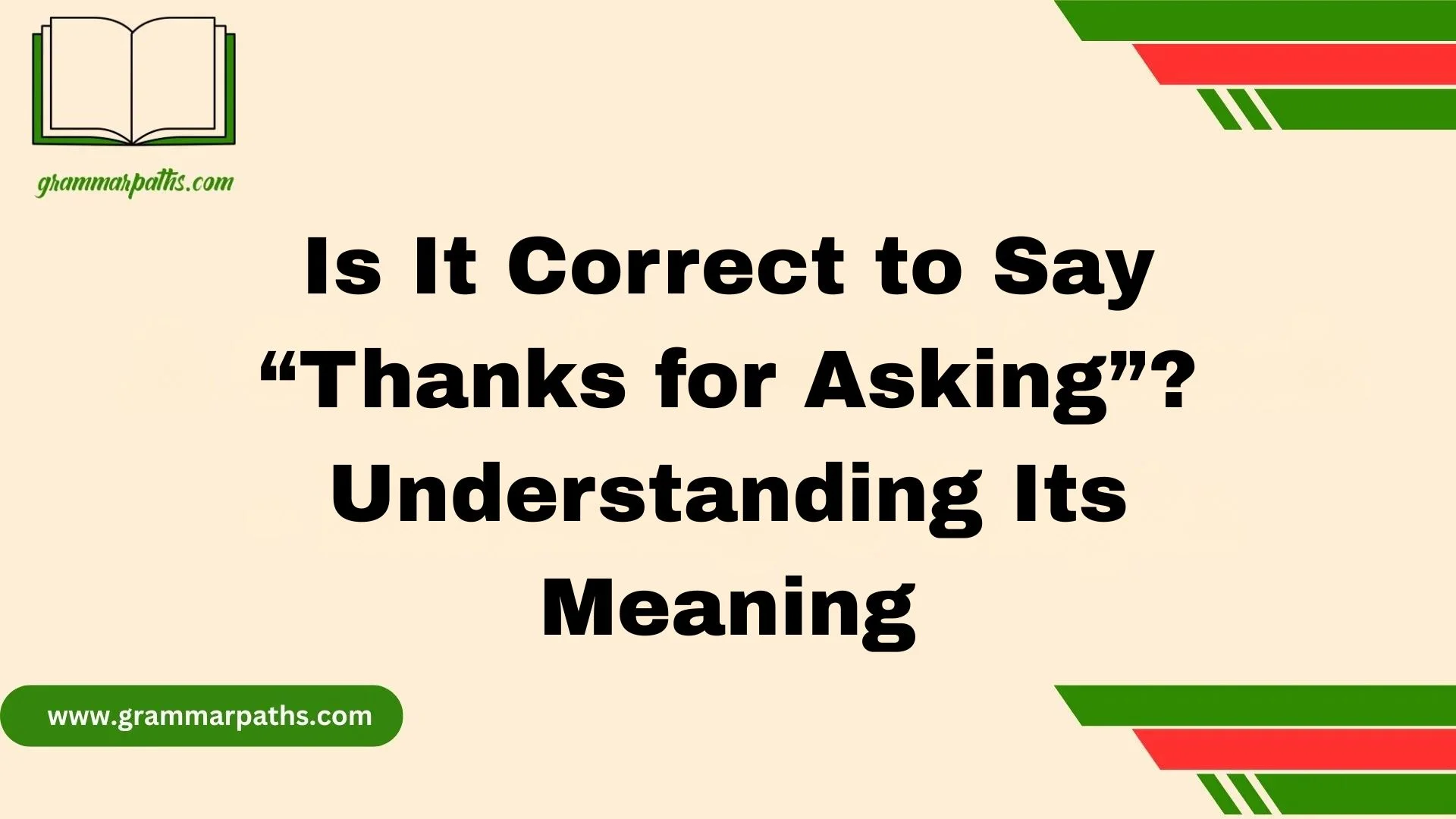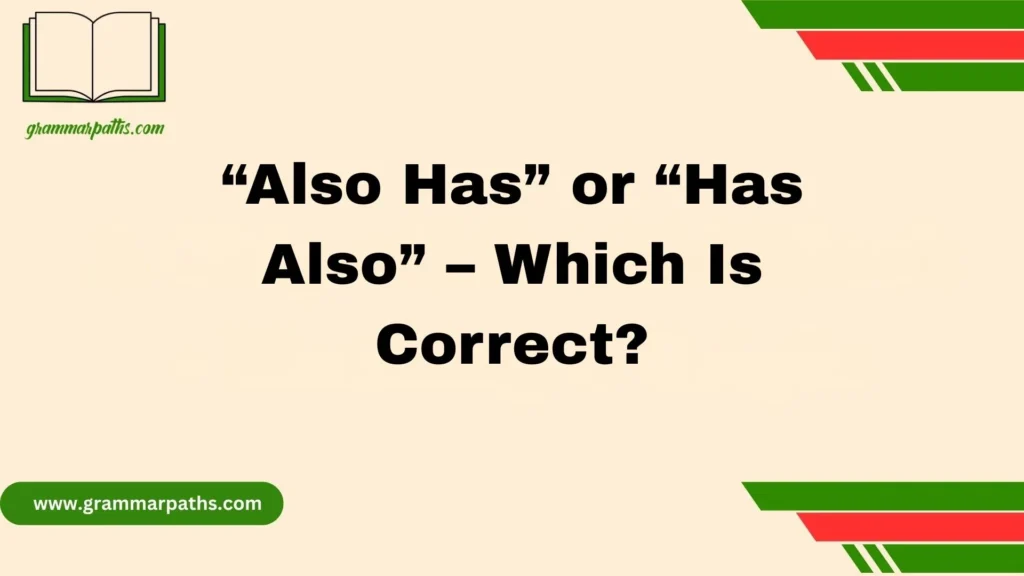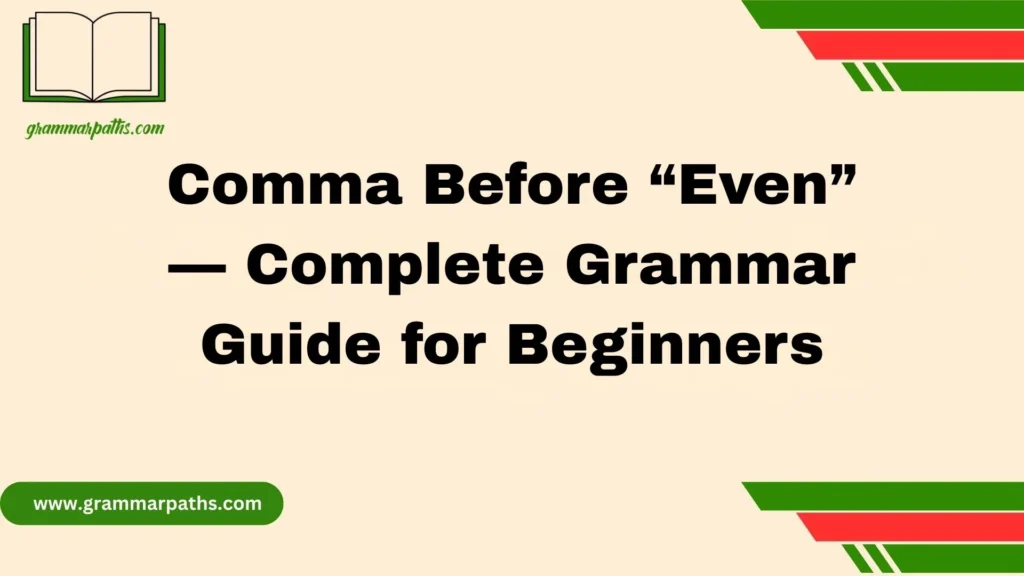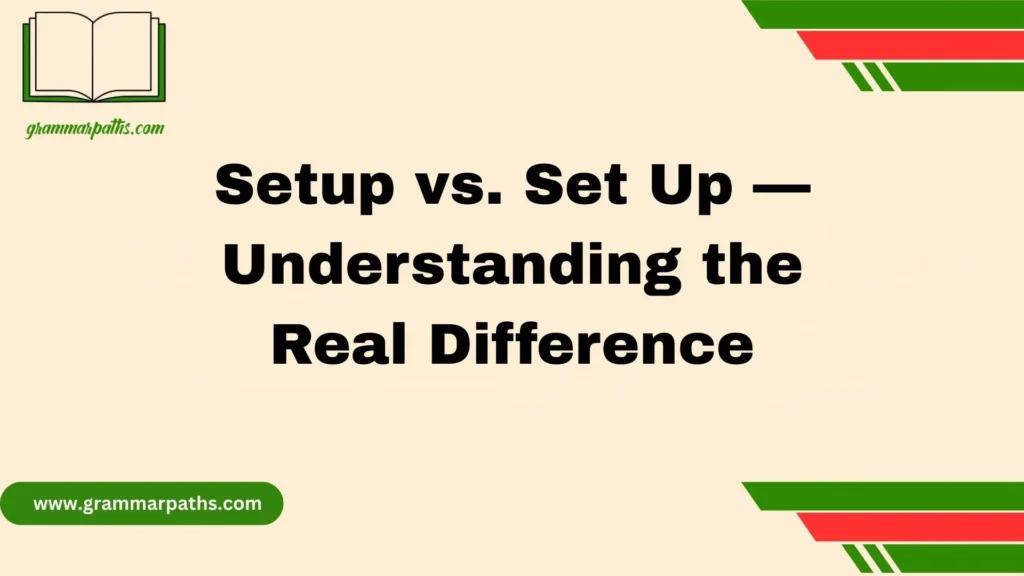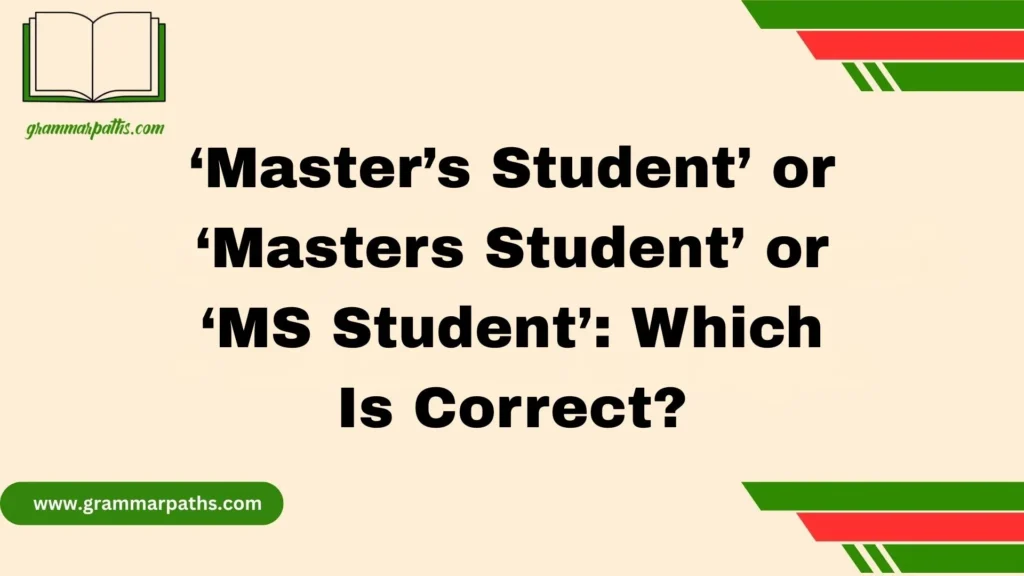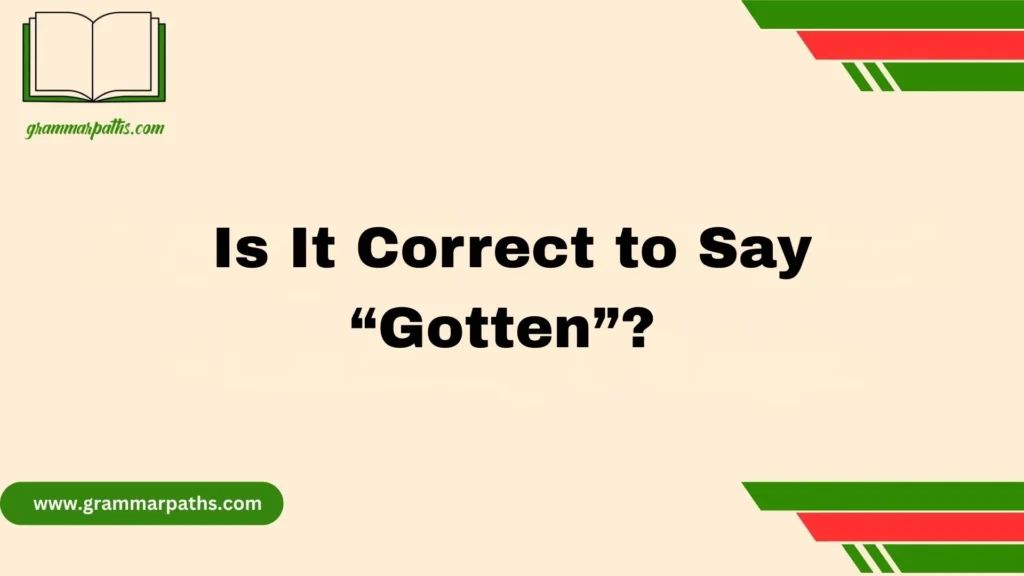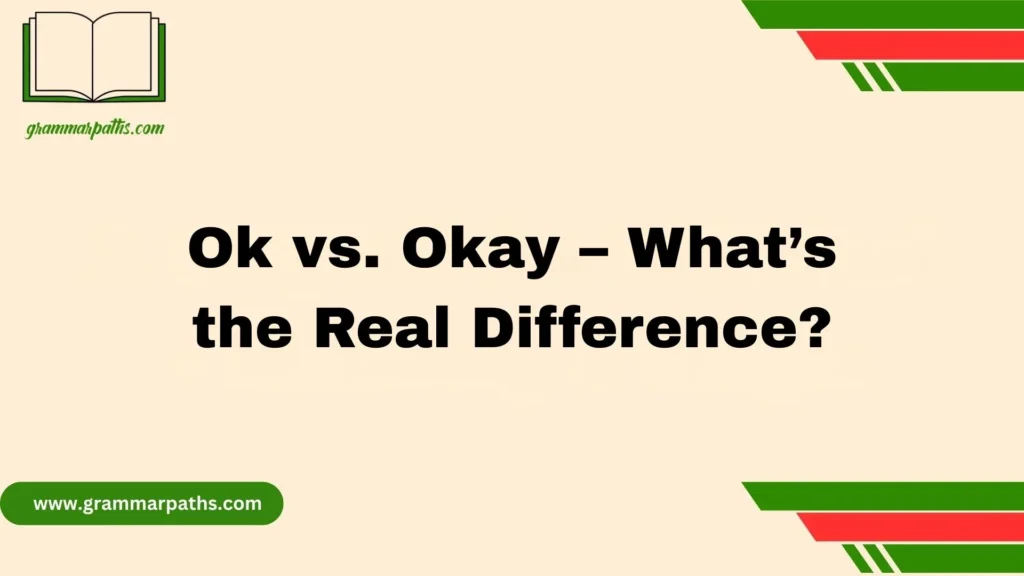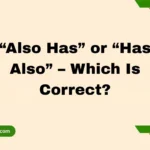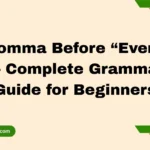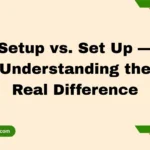In everyday conversation, there are often subtle shifts that can influence how people interpret what you’re saying. The common phrase “Thanks for asking” may sound simple, but whether it feels right or not depends on the fit and the context. From my experience in professional communication and personal coaching, even small phrases can carry big weight. The tone truly matters — a warm tone builds trust, while sarcasm makes the message feel lost. Your intention plays a crucial role in how this language choice will express appreciation or cause confusion. Used carelessly, it can seem dismissive or wrong. Understanding how, when, and why to use it makes a huge difference.
When used genuinely, with warmth and gratitude, the phrase works beautifully. I’ve often said it sincerely, and it builds connection rather than creates distance. But if it feels forced, or used to shut someone down, it loses meaning. Instead of relying on one expression, think of alternatives that better suit your setting — maybe a formal email or a casual chat. Reflect on your intention and choose words that truly show appreciation. When done right, the phrase shines, leaving both sides feeling respected and heard.
Is “Thanks for Asking” Grammatically Correct?
Yes, “Thanks for asking” is grammatically correct. Let’s unpack why.
- “Thanks” is a shortened, informal version of “Thank you.”
- “For asking” is a prepositional phrase explaining what the gratitude is for.
Together, the phrase literally means: I’m expressing gratitude because you asked (a question).
Example Sentences
- “I’m doing better now, thanks for asking.”
- “That’s kind of you to ask — thanks for asking!”
Comparing “Thanks for Asking” vs. “Thank You for Asking”
| Phrase | Tone | Formality | Example |
| Thanks for asking | Friendly, casual | Informal | “I’m fine, thanks for asking.” |
| Thank you for asking | Polite, professional | Formal | “Thank you for asking about the report.” |
Both are grammatically correct. The difference lies in tone and setting. “Thanks” works for casual talk, while “Thank you” fits emails or business interactions.
The True Meaning Behind “Thanks for Asking”
While it’s grammatically correct, the phrase carries emotional and social meaning beyond grammar.
At its core, “Thanks for asking” acknowledges someone’s interest or concern. It’s not always about the question itself — it’s about recognizing the empathy behind it.
For example, when someone asks, “How are you?” after a tough week, replying with “Thanks for asking” shows appreciation for their care, not just their words.
However, people also use it in passing — sometimes automatically, without deep feeling. It can be a politeness formula, similar to “Have a nice day” or “Take care.”
Example Scenarios
- Sincere use:
“It’s been hard lately, but I’m coping — thanks for asking.” - Casual use:
“All good, thanks for asking.”
In both cases, it’s polite, but the tone and intention make the difference.
The Role of Tone and Delivery
Tone can make or break how “Thanks for asking” is received. The same words can sound completely different based on how they’re said.
Three Common Tones
- Warm and sincere
- Spoken with genuine gratitude.
- Usually paired with open body language or a smile.
- Example: “Thanks for asking — that really means a lot.”
- Neutral and polite
- A safe, professional tone used in workplaces or emails.
- Example: “I’m doing well, thanks for asking.”
- Sarcastic or dismissive
- Often said with a sigh, pause, or eye roll.
- Example: “Oh, thanks for asking…” (used when someone didn’t really care).
Tone in spoken English is everything. In text or email, punctuation or emojis can hint at tone — but they can also cause confusion if overused.
When “Thanks for Asking” Sounds Sincere
Genuine gratitude feels authentic, warm, and human. Here’s how to ensure your phrase lands the right way:
Tips for Sounding Sincere
- Speak with a steady tone and natural pace.
- Make eye contact or include positive language if writing.
- Follow up with a short detail or thank-you note.
Example
“I really appreciate your concern. Things have been tough, but I’m hanging in there — thanks for asking.”
In this case, the phrase acknowledges emotional support and builds connection.
Why Sincerity Matters
According to a 2023 University of Michigan communication study, genuine verbal gratitude strengthens relationships and boosts emotional trust. Politeness isn’t just manners — it’s emotional intelligence in action.
When “Thanks for Asking” Sounds Rude or Sarcastic
Ironically, a phrase meant to show gratitude can sound rude if tone or timing is off.
Why It Happens
- Sarcasm: Saying it after someone ignored you or asked too late.
- Defensiveness: Using it to end a topic you don’t want to discuss.
- Flat tone: Lacking warmth or engagement.
Examples of Negative Use
- “Thanks for asking, but I’d rather not talk about it.”
- “Oh, thanks for asking…” (eye roll implied).
Tone plus context can change meaning instantly. In text messages, it’s even trickier — punctuation can seem passive-aggressive if not balanced.
| Version | Perceived Tone | Example |
| Thanks for asking. | Neutral | Basic acknowledgment |
| Thanks for asking! | Positive, friendly | Cheerful tone |
| Thanks for asking… | Possibly annoyed | Suggests sarcasm |
How to Avoid Misinterpretation
- Add warmth: “Thanks for asking, that’s thoughtful.”
- Use exclamation marks sparingly for friendly tone.
- Avoid using it to end uncomfortable conversations abruptly.
“Thanks for Asking” vs. “Thank You for Asking”
These phrases often cause confusion, but both are correct — it’s the setting and tone that define appropriateness.
Detailed Comparison Table
| Phrase | Tone | Context | Example |
| Thanks for asking | Casual, friendly | Everyday chat, informal email | “I’m good, thanks for asking.” |
| Thank you for asking | Respectful, polished | Job interviews, formal writing | “Thank you for asking about my progress.” |
| Appreciate you asking | Personal, empathetic | Close relationships | “I really appreciate you asking about that.” |
Rule of thumb:
Use “Thanks for asking” with friends and colleagues you know well. Use “Thank you for asking” when professionalism or respect is needed.
Contextual Usage: Where It Fits (and Where It Doesn’t)
Knowing when to use “Thanks for asking” matters as much as knowing how.
Professional Settings
Use it:
- In team meetings or check-ins.
- In customer support emails or service interactions.
- After feedback or questions from clients.
Example:
“Thank you for asking about the project timeline. We expect to complete it by next week.”
Avoid it:
- When discussing sensitive or confidential matters.
- When you need to give a factual response instead of emotional gratitude.
Casual Conversations
Use it freely among friends, family, or social chats. It adds warmth and friendliness.
Example:
“I’m feeling great, thanks for asking! How about you?”
Sensitive Topics
Sometimes silence or honesty is better.
If someone asks about a painful subject, and you’re uncomfortable, try:
- “I appreciate your concern — it’s just a tough topic right now.”
- “Thanks for checking in, but I’d rather not go into details.”
Alternatives to “Thanks for Asking”
It’s smart to have alternatives for variety and tone adjustment.
Formal Alternatives
| Expression | Use Case | Example |
| I appreciate your concern. | Professional or serious context | “I appreciate your concern about the project.” |
| Thank you for checking in. | Workplace or formal setting | “Thank you for checking in on the report.” |
| That means a lot. | Emotional or sincere tone | “That means a lot — I’ve been working hard.” |
Informal Alternatives
| Expression | Use Case | Example |
| Glad you asked! | Friendly tone | “Glad you asked! I just got promoted.” |
| Nice of you to ask. | Warm and casual | “Nice of you to ask — I’ve been doing okay.” |
| Appreciate it. | Simple and quick | “Appreciate it — things are fine.” |
Why Use Alternatives?
Using the same phrase too often can sound mechanical. Variety keeps your tone fresh and sincere.
Written vs. Spoken Use: Subtle Differences
The phrase feels different in writing compared to speaking. Tone indicators in text are limited, so punctuation and phrasing become crucial.
Spoken English
- Relies on voice, facial expression, and context.
- A smile or gentle tone makes it friendly.
Written English
- Depends on word choice and punctuation.
- Emojis can soften tone but should be used carefully in professional settings.
| Example | Interpretation |
| “Thanks for asking.” | Neutral, polite |
| “Thanks for asking!” | Warm, friendly |
| “Thanks for asking…” | Possibly irritated or dismissive |
Tip: If you’re unsure, use “Thank you for asking” in writing. It’s safer, especially in emails or client communication.
When Not to Use “Thanks for Asking”
Despite being polite, there are times it’s best avoided.
When It Can Sound Defensive or Dismissive
- When someone asks a sensitive question (e.g., health, finances).
- When it’s used to close a conversation abruptly.
Example:
“Thanks for asking, but I don’t really want to discuss it.”
Better Responses
- “I appreciate you asking, but I’d rather keep that private.”
- “Thanks for your concern — I’m managing.”
Rule:
If gratitude feels forced or used as a barrier, it may sound insincere. Only use it when you genuinely appreciate the question.
Cultural Nuances: Do People Use It the Same Way Globally?
While “Thanks for asking” is common in the U.S., it’s not equally used worldwide.
American English
- Frequent in casual and professional settings.
- Reflects a culture of friendly politeness and verbal warmth.
British English
- Less direct expressions are common. Brits might say, “That’s kind of you to ask,” or “Appreciate you asking.”
Australian English
- Similar to American use, but often more relaxed.
Cultural expectations matter. In some Asian or European cultures, excessive verbal gratitude might sound insincere, while in the U.S., it’s a social norm that signals respect and friendliness.
Quick Grammar and Usage Recap
| Aspect | “Thanks for Asking” | “Thank You for Asking” |
| Grammar | Informal, correct | Formal, correct |
| Tone | Friendly, casual | Respectful, polished |
| Setting | Everyday conversation | Business or professional |
| Emotion | Light appreciation | Sincere gratitude |
Bottom line: Both phrases are correct. Choose based on tone, relationship, and context.
Conclusion
Using the phrase “Thanks for asking” is all about understanding your tone, intention, and context. In my years of experience with communication—both professional and personal—I’ve learned that a small change in expression can make a big difference. When said sincerely and with warmth, it builds connection and trust. But when used with sarcasm or the wrong tone, it can sound dismissive or even confusing. The key is knowing when, how, and why to use it. Choose your words to fit the setting, whether it’s a formal email or a casual chat. When done thoughtfully, “Thanks for asking” truly shines as a phrase of genuine appreciation.
FAQs
1. Is “Thanks for asking” grammatically correct?
Yes, it’s grammatically correct and widely accepted in both spoken and written English.
2. When should I use “Thanks for asking”?
Use it when you genuinely appreciate someone’s curiosity or concern. It works best when your tone matches your gratitude.
3. Can “Thanks for asking” sound rude?
It can if said with a sarcastic tone or in a dismissive way. Always be mindful of your tone and facial expressions.
4. What are alternatives to “Thanks for asking”?
You can say “I appreciate you asking,” “That’s kind of you to ask,” or “I’m glad you asked.” These sound natural and polite.
5. Should I use it in formal writing?
It’s fine in emails or conversations where a friendly tone fits, but avoid it in very formal documents or professional reports.
Summary
- “Thanks for asking” = polite, casual, and grammatically correct.
- Tone decides whether it sounds genuine or sarcastic.
- Context matters — use it warmly and appropriately.
- Alternatives help keep your speech fresh and sincere.

Grace Marie is the dedicated writer behind GrammarPaths.com, where she shares her passion for English grammar, idioms, and writing mastery. With a strong background in language studies and years of experience helping learners improve their communication skills, Grace creates clear, practical, and engaging content that makes English easy to understand.
